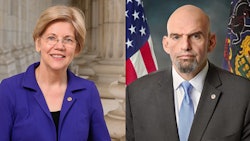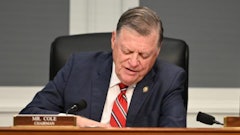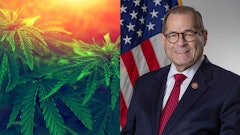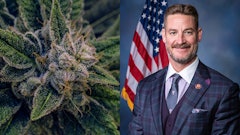
When news broke April 30 that the Drug Enforcement Administration (DEA) was moving to reclassify cannabis as a less dangerous substance under the Controlled Substances Act (CSA), reactions from industry and political leaders were mixed.
Many applauded the move to Schedule III from Schedule I, which The Associated Press first reported and was later confirmed by a Department of Justice spokesperson in a statement to Cannabis Business Times. Executives from plant-touching companies noted its significance as a historic step toward federal cannabis reform, destigmatization, fairer tax policies for businesses and more research into cannabis’s medical benefits.
RELATED: DEA Moves to Reschedule Cannabis
However, many also tempered the celebratory tone and said that there was much more work to be done. Leaders from industry nonprofit organizations and some lawmakers emphasized their call for the federal government to deschedule cannabis altogether, something they urged after news circulated that the U.S. Department of Health and Human Services (HHS) recommended that the DEA reschedule cannabis in August 2023, explaining that rescheduling would not address the harms of prohibition nor end the criminalization of cannabis.
Cannabis Business Times has compiled more than 40 responses to the rescheduling news from executives from cannabis companies, lawmakers, leaders from nonprofit organizations advocating for reform and more, with commentary on both the significance and limitations of reclassifying cannabis.
Matt Darin, CEO, Curaleaf:
“Today’s decision by the DEA to reschedule cannabis to Schedule III is one of the most monumental developments that cannabis has seen in years and is a crucial step in undoing the harms caused by the failed and discriminatory War on Drugs. We are thankful to President Biden and his Administration for helping to push this process forward. This ruling reflects evolving attitudes towards the plant, recognizing its well-documented therapeutic value and medicinal applications. ... The future for the cannabis industry is real, and we look forward to seeing what 2024 has in store.”
David Goubert, president and CEO, AYR Wellness:
“This represents the most significant step towards federal cannabis reform in U.S. history and will provide much needed relief to operators of all shapes and sizes, allowing us fair tax treatment by eliminating 280E, in addition to allowing for additional research into the medical efficacy of cannabis. AYR Wellness, along with many of its peers, continues to advocate for the full de-scheduling of cannabis, and feel today’s news represents positive progress towards that eventual outcome.”
Dennis Curran, CEO & chairman, Acreage Holdings:
“Acreage strongly applauds the DEA's decision to reclassify cannabis as a Schedule III substance under the Controlled Substances Act. For far too long, restrictive policies have stifled the scientific examination of the plant’s many healing capabilities. With this massive hurdle removed, more research can be done to learn about the medical efficacy of cannabis and the positive impact that it can have on the health and wellness of millions of people across the country. With this monumental move also comes the elimination of 280E, which has burdened cannabis businesses and kept the industry from reaching its full potential. Finally, cannabis operators will be able to compete and operate on a more level playing field with other businesses in the country.”
John Mueller, founder and CEO, Greenlight:
“This is a major nail in the coffin on a failed 50-year prohibition policy. Good riddance, let it rest in peace. We’re finally headed in the right direction after all these years, but we still have a long way to go. This is a major milestone for a marginalized industry that’s been fighting for recognition. We’re more than ready to be recognized as a legitimate industry on its way to becoming a $50 billion market. It’s about time we embraced progress and leave outdated practices behind.”
Wendy Bronfein, co-founder, chief brand officer, Curio Wellness:
“While this move to Schedule III could provide much-needed relief from the crushing tax burden of 280E, we must seek a balance between exercising federal oversight and enforcement responsibilities while preserving each state’s ability to determine the best approach to cannabis within its borders.
“I firmly believe the industry should continue advocating for the descheduling of cannabis; for as long as cannabis is listed as a scheduled substance, there will always be an inherent conflict between federal and state law. The way to eliminate stigma and legitimize the legal cannabis industry is to fully remove cannabis from the Controlled Substances Act.
“While the pending DEA announcement is historic, we must continue advocating for policies that create more certainty for the cannabis industry and consumers so they can trust the products they’re consuming are safe.”
Ed Schmults, CEO, StateHouse Holdings:
“The DEA’s decision to reschedule cannabis from Schedule I to Schedule III is a commendable step toward fostering a more progressive and inclusive cannabis industry. This move not only reflects a commitment to evidence-based policymaking but also signals a recognition of the industry's economic potential and its positive impact on job creation. By loosening regulatory constraints, the government will be empowering businesses, encouraging innovation, and contributing to the overall growth and maturation of the cannabis sector.”
George Archos, founder and CEO, Verano:
“If confirmed, another significant domino has fallen in the fight to legalize cannabis and unlock its full potential as an industry, and we applaud the Department of Health and Human Services for pushing this reform forward, and the Drug Enforcement Administration for rescheduling cannabis to Schedule III, appropriately amending harmful decades-long prohibition policies and the failed war on drugs, which have negatively impacted our society, and particularly communities of color, for far too long.”
John Hartmann, CEO, Ascend Wellness:
“This favorable industry development could improve customer and patient access, enhance access to funding, provide broader research avenues, and more. As we navigate this transformative landscape, Ascend eagerly anticipates exploring further potentials, including potentially up-listing to major exchanges.”
David Craig, CMO, Illicit Gardens:
“Today’s historic rescheduling proves what cannabis enthusiasts have always known—cannabis is a legitimate medicine with proven uses. While this isn’t the dream of full recreational legalization at the federal level many were hoping for, this is the next best thing and one with immediate positive impacts for all cannabis businesses and consumers alike. If there’s one thing cannabis businesses are, it’s resourceful, and with these loosening of restrictions we can finally see what this industry really can do.”
Mike Sassano, CEO, Somai Pharmaceuticals:
"The global medical cannabis community and every health regulatory agency entered the New Year with a present from the biggest and most well-funded health authority in the world, the HHS, who said that cannabis is both safe and has medical benefits for pain and at LEAST 15 other indications. This is the single-most significant finding conducted in the largest medical market (U.S.) with findings attributed to 30,000 physicians and 6 million registered patients for an almost two-decade period. Safe for a population and medical benefits from the HHS will ignite a global medical cannabis boom that will sweep the globe!"
Jason Wild, executive chairman, TerrAscend:
“Today’s news is a critical first step towards aligning U.S. cannabis laws with scientific evidence. TerrAscend looks forward to the positive impact that today’s news will have on patients, consumers, and the industry.”
Brady Cobb, CEO and founder, Sunburn Cannabis:
“This is one of the most historic moments in the decades-long fight to end the U.S. government's failed war on the cannabis plant. Cannabis has never belonged on Schedule I with drugs like cocaine and heroin or, as President Biden noted, on a more restrictive schedule than fentanyl, and the move to Schedule III is the first real step towards meaningful reform. A tremendous amount of work has been done by so many people, and while I’ve been critical of the Biden administration on the timing of this move, credit is due for actually making it happen. Onward.”
Omar Delgado, vice president of retail, Ivy Hall:
“The proposed removal of cannabis from its unjust Schedule I classification marks a historic day for our industry. For years, the cannabis industry has faced undue scrutiny and legal hurdles due to its classification, which has perpetuated harmful stereotypes and disproportionately impacted marginalized communities, particularly communities of color. The removal of cannabis from Schedule I is not just a victory for the cannabis industry; it is a victory for justice, freedom, and human rights. At Ivy Hall, we are proud to be part of this historic moment, and we remain dedicated to creating a future where cannabis is celebrated, not criminalized."
Niklas Kouparanis, CEO, Frankfurt-based Bloomwell Group:
“Should the DEA move forward with plans to reclassify cannabis in the U.S. from Schedule I to Schedule III under the Controlled Substances Act, such actions would be historic not just for American cannabis patients, but for those around the globe as well. The rescheduling of cannabis in the U.S. can broaden access to cannabis for medical purposes and may lawfully be dispensed by prescription.
“Germany reclassified cannabis as of April 1 and can now serve as a guide for the forecasted expansion of the U.S. medical cannabis industry under this change. In Germany, following reclassification, we saw a significant uptick [20,000 by the second week of reclassification in Germany] in medical cannabis patient applications and demand for telemedical appointments with physicians to prescribe the treatment.
“We can expect to see the same rise in demand that we’ve seen in Germany in the U.S. under reclassification. While cannabis treatments will take time to be approved by the FDA, the medical cannabis community needs to prepare for the rise in demand and expand patient services. This means building up the seed-to-sale value chain and expanding patient access through telemedicine platforms. It is also crucial for more research to be funded and accepted throughout the medical and scientific communities to unlock the plant's full potential as a treatment.”
Alyza Brevard Rodriguez, owner, The Other Side Dispensary:
"It’s not only the potential tax benefits and financial relief through write-offs, especially during the crucial early years of opening a business, but it also opens doors for more research opportunities, reducing stigmatization and legitimizing the industry further. These changes could usher in a new era of acceptance and growth for cannabis businesses, fostering innovation and expanding its role in the economy."
Nicolas Guarino, CEO, Naturae:
“The U.S. DEA’s decision to accept health regulators’ recommendation to reschedule cannabis from Schedule I to Schedule III is a critical step in transforming cannabis into the mainstream industry that it already is for most Americans. Section 280E of the IRS tax code has been one of the greatest burdens on operators across the supply chain, and with this decision, cannabis business owners will be able to file taxes like any other business, saving billions of dollars for the industry as a whole.
“Rescheduling will also be a boon to the country’s medical market, but the adult-use markets of 24 states and D.C. still face great limitations that hinder the legal industry from reaching its full potential. We’re hopeful that this progressive and landmark decision will set an example, and pave the way for improved measures like SAFE Banking, increased access to logistic providers and to capital, and ultimately, to federal legalization.”
U.S. Rep. Earl Blumenauer, D-Ore.:
“Marijuana was scheduled more than 50 years ago based on stigma, not science. The American people have made clear in state after state that cannabis legalization is inevitable. The Biden-Harris administration is listening.”
U.S. Senate Majority Leader Chuck Schumer, D-N.Y.:
“It is great news that DEA is finally recognizing that restrictive and draconian cannabis laws need to change to catch up to what science and the majority of Americans have said loud and clear.
“While this rescheduling announcement is a historic step forward, I remain strongly committed to continuing to work on legislation like the SAFER Banking Act as well as the Cannabis Administration and Opportunity Act, which federally deschedules cannabis by removing it from the Controlled Substances Act.
“Congress must do everything we can to end the federal prohibition on cannabis and address longstanding harms caused by the war on drugs.”
U.S. Rep. Barbara Lee, D-Calif.:
“While the rescheduling of marijuana is a historic step in the right direction, anything short of descheduling falls woefully short of remedying the harms of the current system and the failed racist war on drugs. Rescheduling would allow for the criminal penalties for recreational and medical marijuana use to continue—disproportionately impacting Black and Brown communities. The criminalization of marijuana is also increasingly out of step with state law and public opinion. We need full descheduling and to pass the MORE Act—which I proudly co-lead—as a solution for equitable comprehensive marijuana reform rooted in racial and restorative justice.”
U.S. Sen. Kirsten Gillibrand, D-N.Y.:
“Descheduling marijuana from the Controlled Substances Act is not just a social justice issue; it’s an economic, medical, and public safety issue. Since marijuana was classified as a Schedule I substance during the war on drugs, countless lives have been torn apart, and individuals in primarily Black and Brown communities have been targeted for nonviolent cannabis-related offenses. Studies show that legalizing marijuana could help reduce violence in international drug trafficking and generate billions of dollars for the economy. The vast majority of Americans agree that marijuana should be legalized—that’s why I’m calling on the attorney general and the Drug Enforcement Administration to swiftly deschedule marijuana from the Controlled Substances Act.”
U.S. Rep. Jerry Nadler, D-N.Y.:
“While rescheduling marijuana is an important step, we must go further. It is time to end the prohibition and criminalization of marijuana at the federal level. That’s why I have introduced the Marijuana Opportunity Reinvestment and Expungement Act, or the MORE Act, which would not only decriminalize marijuana under federal law, but it would also expunge federal marijuana convictions and encourage states to do the same. The bill would also establish a fund to support programs assisting those communities who were most directly harmed by the war on drugs and ensure that they have equal access to the benefits of decriminalization.”
Paul Armentano, deputy director, NORML:
“It is significant for these federal agencies, and the DEA and FDA in particular, to acknowledge publicly for the first time what many patients and advocates have known for decades: that cannabis is a safe and effective therapeutic agent for tens of millions of Americans.
“The goal of any federal cannabis policy reform ought to be to address the existing, untenable divide between federal marijuana policy and the cannabis laws of the majority of U.S. states. Rescheduling the cannabis plant to Schedule III fails to adequately address this conflict, as existing state legalization laws — both adult use and medical — will continue to be in conflict with federal regulations, thereby perpetuating the existing divide between state and federal marijuana policies.
“Just as it is intellectually dishonest and impractical to categorize cannabis in the same placement as heroin, it is equally disingenuous and unfeasible to treat cannabis in the same manner as anabolic steroids and ketamine. The majority of Americans believe that cannabis ought to be legal and that its health risks are less significant than those associated with federally descheduled substances like alcohol and tobacco. In fact, HHS reached a similar conclusion regarding cannabis’ safety profile in its own analysis.
“Like those latter substances, NORML has long argued that the cannabis plant should be removed from the Controlled Substances Act altogether, thereby providing state governments—rather than the federal government—the ability to regulate marijuana in the manner they see fit without violating federal law, and allowing the federal government to provide standards and guidelines for regulated cannabis markets.”
Cat Packer, director of drug markets and legal regulation, Drug Policy Alliance:
“Supporting federal marijuana decriminalization means supporting the removal of marijuana from the Controlled Substances Act, not changing its scheduling. We all deserve a federal framework for marijuana that upholds the health, wellbeing, and safety of our communities—particularly Black communities who have borne the brunt of our country’s racist enforcement of marijuana laws. Rescheduling marijuana is not a policy solution for federal marijuana criminalization or its harms, and it won’t address the disproportionate impact that it has had on Black and Brown communities.
“The individuals, families and communities adversely impacted by federal marijuana criminalization deserve more. Workers in the marijuana industry, people who use marijuana, all of us deserve more. Congress and the Biden administration have a responsibility to take actions now to bring about marijuana reform that meaningfully improves the lives of people who have been harmed by decades of criminalization. Descheduling and legalizing marijuana the right way isn’t just good policy; it’s popular with voters, too.”
Matthew Schweich, executive director, Marijuana Policy Project:
“This is a positive step forward for federal cannabis policy; however, it is a rather modest step given the strong support among American voters for comprehensive cannabis reform. It is important to acknowledge that this rescheduling would not affect the criminalization of medical cannabis patients and cannabis consumers under state laws – so we must continue the work of enacting sensible and fair cannabis legalization and medical cannabis laws through state legislatures and ballot initiatives.
“I’m underwhelmed by the progress made during President Biden’s administration; I think it was fair to expect more. It was absurd to consider cannabis to be more dangerous than heroin, as is the case today. It will remain absurd to consider cannabis to be more dangerous than alcohol, Xanax, and Valium, which will still be the case after this rescheduling takes effect.”
Saphira Galoob, executive director, National Cannabis Roundtable:
“While NCR continues to call for federal action to address criminal justice reform and empower existing state programs, rescheduling marks a monumental shift in federal cannabis policy as our fight to end prohibition continues. … This is critical for state legal cannabis businesses to be treated with fairness and to have the resources needed to reinvest in their workforce and community – and to survive the threat the illicit market poses to the regulated market and public safety. But we know our work does not stop here, particularly when it comes to righting the wrongs of the war on drugs. While we celebrate progress today with this historic news, we remain committed to continuing the conversations with our federal partners to enact additional cannabis reforms that are long overdue – starting with getting SAFE Banking passed this year and ultimately ending the harmful and misguided policy of federal prohibition.”
Andrew Freedman, executive director, Coalition for Cannabis Policy, Education and Regulation:
"The federal prohibition of cannabis is centered first and foremost on its unique danger to society. The DEA has just recognized that those dangers were comparatively and empirically overblown. It is time that the federal government got more nuanced about its approach to cannabis, especially as states legalize and Americans openly admit to using the product."
Sarah Gersten, executive director, Last Prisoner Project:
"Last Prisoner Project believes that complete descheduling and full legalization of cannabis is a necessary step towards correcting past injustices and creating a fair and equitable criminal legal system. We will continue to work tirelessly to ensure that individuals burdened with past cannabis convictions have their records expunged and that all cannabis prisoners are released, regardless of the federal scheduling decision. Despite not achieving full legalization, we must use this historic moment to push the fight for cannabis justice forward and we intend to do so by leveraging this reclassification for broader criminal legal reforms as outlined here.”
Michael Bronstein, president, American Trade Association for Cannabis and Hemp:
“Reclassifying cannabis to Schedule III recognizes it will advance safety and responsible use by supporting the regulated market, which is bound by strict state rules concerning age restrictions, marketing to adults, product safety, and quality. The move should further signal to the criminal justice system that cannabis should be a lower priority and to ease restrictions. ATACH will continue the fight to reclassify cannabis and we applaud today’s long-awaited news.”
Gretchen Gailey, co-founder, American Cannabis Collective:
“While this move is undoubtedly a huge win for patients, we must not lose sight of the broader context. Moving cannabis to Schedule III does not mark the end of prohibition. We caution against any attempts to overstate the significance of this decision. It remains imperative for states to continue their efforts to legalize cannabis and for the federal government to take decisive action to fully deschedule cannabis. This decision may bring an end to certain regulatory burdens such as Section 280E, but its implications for the industry as a whole remain uncertain.”
Amber Senter, co-founder, board chair, and executive director, Supernova Women:
“…Rescheduling cannabis to Schedule III is not enough. People will continue to be criminalized and punished for possessing and consuming cannabis, risking employment, housing, benefits and more. Workers in the cannabis industry will run the risk of federal prosecution for simply going to work and trying to provide for themselves and their families. Patients using cannabis as medicine through legal or state medical programs will also run the risk of federal criminalization by simply choosing a less harmful way to cope with pain from debilitating medical conditions. The war on drugs will continue to rage on, destroying lives and families as it's done for decades. As a business owner in cannabis, I recognize the much-needed tax relief that rescheduling cannabis to Schedule III will bring. However, we cannot continue to allow some to capitalize from cannabis while others, primarily Black and Brown people, continue to be punished with their lives ruined. We must deschedule cannabis and stop criminalization for a medically beneficial plant.”
Chelsea Higgs Wise, executive director, Marijuana Justice:
"Since prohibiting marijuana, there has been a targeted enforcement that has left communities of color disproportionately harmed at the individual, familial and community level. Rescheduling only brings benefits to businesses through tax relief, while our loved ones are left with the guarantee of repetitive surveillance, imprisonment, and collateral consequences. Any federal reform must directly address the disproportionate enforcement Black families continue to face. Presidential pardons are important but for true repair, we must continue to demand for marijuana to be descheduled along with people released and records expunged."
Michelle Rutter Friberg, director of government affairs, National Cannabis Industry Association:
“While rescheduling marijuana to Schedule III will undoubtedly provide much needed tax relief to cannabis businesses, the Biden administration and Congress must act to deschedule marijuana and remove it from the Controlled Substances Act entirely. Only descheduling marijuana will harmonize federal law with the 37 states with some form of legal cannabis commerce, allow for the implementation of sensible regulations on hemp and marijuana derived products, and create a level playing field for small and minority owned businesses in the industry."
Rachel Knox, M.D., MBA, board chair, Association for Cannabis Health Equity and Medine (ACHEM):
“Cannabis must be removed from the Controlled Substances Act. From inception, its scheduling has been public health enemy No. 1, as it has underpinned decades of racist and classist provocation, perpetuating systemic harms directly linked to generational poverty and escalating health disparities in marginalized communities. Rescheduling does nothing to unravel this framework and, in fact, will allow it to continue unchecked. The only remedy to this chronic threat is descheduling, the swift overhaul of discriminatory cannabis policies across all sectors, and thoughtful regulation of diverse cannabis markets with standards rooted in science and social justice.”
Lt. Diane Goldstein (Ret.), executive director, Law Enforcement Action Partnership:
“As the failed policies of marijuana prohibition continue to drag on and waste law enforcement resources, the DEA’s move to reschedule marijuana to a less restrictive class would simply not go far enough. It would not end federal marijuana criminalization and would do little to rectify the harms of the current system, in which an arrest record can lead to fewer employment opportunities, limited housing options, and obstacles to obtaining loans, all of which make people more, not less, disposed to crime and further drug use. The only way to end this unnecessary criminalization and its harms is to completely remove marijuana from the Controlled Substances Act."
Dasheeda Dawson, chair, Cannabis Regulators of Color Coalition and founding director, Cannabis NYC:
"The time for descheduling cannabis is not just a matter of policy; it's an imperative for justice and equity. Rescheduling would undermine the hard-fought progress made by cannabis equity and policy reform leaders like the Cannabis Regulators of Color Coalition, jeopardizing the livelihoods and futures of those entrepreneurs and communities disproportionately affected by past criminalization. We cannot afford to backtrack on our commitment to repair the harm inflicted by outdated policies. Descheduling is not just about legality; it's about rectifying historic injustices and ensuring a fair and inclusive future for all."
Weldon Angelos, president and co-founder, The Weldon Project:
“Only the complete descheduling of marijuana will begin to dismantle the barriers of a nationwide criminal ban and ensure that no further damage is inflicted after decades of misguided federal policies. As we navigate this pivotal moment, our actions must be bold and unequivocal to ensure justice and equity for all those who have suffered under the weight of prohibition. If our ultimate goals are to liberate and restore American communities, now is not the time to settle for half measures or, worse yet, to declare victory and pretend like everything’s been solved. It hasn’t.”
Chuck Smith, president of the board of directors, Colorado Leads:
“This is a truly historic development in federal cannabis policy that will have significant impacts on the legal marijuana industry in Colorado and throughout the nation. This is by no means the end of the line for federal reform, and we will continue to support efforts to treat it more like alcohol, which is in line with the views of most Colorado voters.
“This is a major step in the right direction, and its significance cannot be overstated. Perhaps most notably, reclassification under Schedule III will address the 280E tax issue that has unfairly forced state-legal cannabis businesses to pay a far higher effective tax rate than other legal businesses. Allowing marijuana businesses to start deducting ordinary business expenses will allow Colorado companies to retain more revenue, employ more workers, and further invest in their surrounding communities.”
Sundie Seefried, CEO, Safe Harbor Financial:
The profound impact of rescheduling cannabis from Schedule I to Schedule III would signify a crucial shift in the perception of cannabis, recognizing its medical potential and solidifying its legitimacy in the financial realm. From a banking and lending perspective, we believe that the reclassification of cannabis will broaden lending opportunities for cannabis businesses, leading to access to lower interest rates, increased access to capital and improved financial stability across the industry. This newfound access to traditional financing channels has the potential to stimulate growth, innovation and compliance efforts within the industry, ultimately fostering economic development and job creation. Furthermore, the global implications of potential rescheduling cannot be overlooked. Elevating cannabis to Schedule III demonstrates the United States’ leadership on an international scale, and has the potential to positively influence agreements and international treaties with organizations like the United Nations and World Health Organization. This shift could hold significant weight, especially for other countries seeking to challenge current classifications and legalize cannabis sales.”
Anthony Coniglio, CEO, NewLake Capital Partners:
“This rescheduling carries significant implications for the entire cannabis landscape. Firstly, it will alleviate the burdens imposed by 280E tax regulations, bolstering the credit quality of cannabis operators … . We project that our tenants stand to collectively save over $400 million annually in taxes, leading to increased cash flows for their businesses. Moreover, this pivotal move by the federal government is poised to stimulate additional investment in the sector, potentially enabling operators to strengthen their balance sheets, thus enhancing the industry’s credit quality, including our tenant base.”
Adam Wilks, CEO, Carma HoldCo:
“Embracing this momentous shift in marijuana classification isn't just about changing policies; it's about a new era of understanding and opportunity. … This reclassification will not be just a regulatory adjustment; it's a validation of what we've known all along: cannabis isn't a threat; it's a solution. It's time to rewrite the narrative, break down barriers, and usher in a future where cannabis is celebrated for its potential to heal, inspire, and empower. And as we stand on the cusp of this historic moment, let's remember: this industry is just getting started.”
Irina Dashevsky, partner and co-chair, Greenspoon Marder’s Cannabis Law practice group:
“The cannabis public markets are already reacting. This is the most significant development at the federal level since cannabis was put on the Controlled Substances Act. There is still a long rulemaking and public comment process ahead. State adult use cannabis markets are unlikely to be affected, but the biggest takeaway for the current-state legal industry is the applicability of IRC 280E goes away. I expect it to lead to renewed investor appetite in the industry and a lot of proper research and development into cannabis.”
Editor's Note: Statements have been edited for style, length, clarity and bolded for emphasis.


























